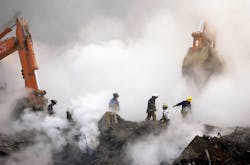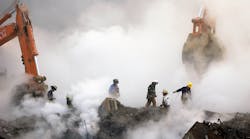Responders and survivors of the 9/11 terrorist attacks who suffer cancer have still more hurdles to clear before they will get free health treatment under a federal compensation law.
A new certification will be required, involving a visit to a doctor charged with medically corroborating each of the cancer cases, followed by a federal review of each applicant's case, according to a regulation published last week.
The federal government published a final rule Sept. 12 to include about 60 types of cancer on the official list of World Trade Center-related conditions under the James Zadroga 9/11 Health and Compensation Act. At least 60,000 responders and survivors are enrolled in the act's health care program.
The rule, which takes effect Oct. 12, makes it clear that having one of the specified cancers does not guarantee a responder or survivor will get free cancer treatment.
Once health officials develop guidelines, those with cancer will have to go through a two-step process to see if their cases will be covered.
They must be examined by a doctor in one of National Institute of Occupational Safety and Health's WTC Health Program centers. Their application must then be approved by NIOSH administrator, Dr. John Howard.
Certifying doctors will have to conclude that a person's individual exposure to airborne toxins resulting from the attacks was "substantially likely to be a significant factor" in getting the cancer.
'Hurry-up-and-wait'
Dr. Jacqueline Moline, director of the WTC Health Program in Queens, said her center is in the "hurry-up-and-wait phase." She expects to be available for cancer patients on Oct. 12 -- but that is only to begin the certification process.
A total of 110,000 responders and survivors will be allowed to enroll in the health program. It is unclear how many of them have or could develop cancer.
Attorneys for many responders and survivors with cancer worry it could take six to 12 months before those clients officially qualify for free treatment.
They also have questions about whether cancer sufferers or the family of those who have already died from the disease will be compensated for medical costs they have already paid.
"What we've learned is it's not a slam dunk -- just because you have one of the specified cancers, you still have to be certified," said Noah Kushlefsky, a Manhattan lawyer.
According to the rule, a number of factors will be weighed for certification, including where, when and for how long a person was exposed, and his or her medical history.
Kushlefsky and fellow Manhattan lawyer Michael Barasch, who together represent about 6,000 first responders and survivors, said they welcome the rigorous process -- even as they acknowledge more responders will die while they wait.
"I'm brokenhearted scores of deserving first responders will die before they receive one penny, but I'm confident that the system is working and that everyone who deserves it will get fair compensation in due course," Barasch said.
Awaiting guidelines
Electrician Bruce Edwards, 55, of Ronkonkoma, worked to restore power in a building close to Ground Zero after the attacks. In 2007, he was diagnosed with stage four non-Hodgkins lymphoma. He welcomed the cancer coverage but worries about what will happen after 2016 when Zadroga funding is slated to end. "Some other diseases may show their ugly heads in five more years," he said.
Kushlefsky and Barasch are advising clients to call their local WTC health center for a certification appointment.
"A client who called this week was given a date in February," said Kushlefsky. "That's not unreasonable because federal officials still have to create and disseminate the guidelines and train people to make sure they are applied uniformly," he added.
Dr. Benjamin Luft, director of the World Trade Center Health Program of Suffolk, Nassau and Brooklyn, said: "I am personally committed to making sure everything is seamless for those patients that have cancer and that we don't disrupt their care or lives."
Luft and Moline said their centers are waiting for the guidelines before scheduling appointments.
Still, the tension in the "hurry-up-and-wait" is perhaps most obvious among advanced cancer sufferers, many of whom have already attended funerals of fellow 9/11 cancer patients.
For Ray Pfeifer, 54, of Hicksville, diagnosed with stage four kidney cancer in 2009, it's a fine line. "I believe in the process of being checked out thoroughly -- it needs to be done for everyone's sake so the money is spent right."
On the other hand, Pfiefer, a 26-year veteran firefighter who worked at Ground Zero, said he is a very sick man with college-age children whose family has been sent to the financial brink by the cost of his treatments. He just has one question: "How long will this new step take?"
Copyright 2012 - Newsday
McClatchy-Tribune News Service







